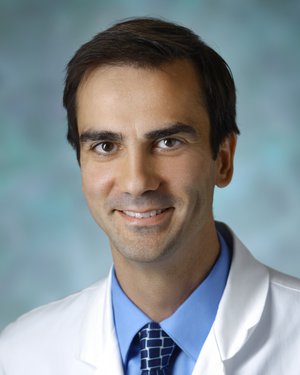Research Lab Results
-
Emily Kendall Research Group

-
Eric Nuermberger Lab
Research in the Eric Nuermberger Lab focuses primarily on experimental chemotherapy for tuberculosis. We use proven murine models of active and latent tuberculosis infection to assess the effectiveness of novel antimicrobials. A key goal is to identify new agents to combine with existing drugs to shorten tuberculosis therapy or enable less frequent drug administration. We're also using a flow-controlled in vitro pharmacodynamic system to better understand the pharmacodynamics of drug efficacy and the selection of drug-resistant mutants during exposure to current agents.
-
Erica Johnson Lab
Research in the Erica Johnson Lab investigates infection control in military deployment environments as well as infections that are associated with combat trauma. We explore topics such as HIV outcomes, gender-based health issues and disparities in care.
-
Elizabeth Tucker Lab
Research in the Elizabeth Tucker Lab aims to find treatments that decrease neuroinflammation and improve recovery, as well as to improve morbidity and mortality in patients with infectious neurological diseases. We are currently working with Drs. Sujatha Kannan and Sanjay Jain to study neuroinflammation related to central nervous system tuberculosis – using an animal model to examine the role of neuroinflammation in this disease and how it can differ in developing brains and adult brains. Our team also is working with Dr. Jain to study noninvasive imaging techniques for use in monitoring disease progression and evaluating treatment responses. -
Yukari Manabe Lab
Investigators in the Yukari Manabe Lab evaluate the accuracy of rapid, point-of-care diagnostics for HIV, tuberculosis and related infectious diseases in resource-limited settings particularly sub-Saharan Africa and examine the impact of diagnostic interventions on disease detection and patient outcomes. The team also conducts operational and translational research in tuberculosis and HIV co-infection.
-
Kathleen Page Lab
Research in the Kathleen Page Lab examines the impact of bovine colostrum (BC) on immune activation and HIV susceptibility, and aims to develop a point-of-care diagnostic test for histoplasmosis.
-
Karakousis Lab
The Karakousis Lab is primarily focused on understanding the molecular basis of Mycobacterium tuberculosis persistence and antibiotic tolerance. A systems biology-based approach, including the use of several novel in vitro and animal models, in combination with transcriptional, proteomic, genetic, imaging, and computational techniques, is being used to identify host cytokine networks responsible for immunological control of M. tuberculosis growth, as well as M. tuberculosis regulatory and metabolic pathways required for bacillary growth restriction and reactivation. In particular, we are actively investigating the regulatory cascade involved in the mycobacterial stringent response. Another major focus of the lab is the development of host-directed therapies for TB, with the goal of shortening treatment and improving long-term lung function. Additional research interests include the development of novel molecular assays for the rapid diagnosis of latent TB infection and active TB disease, and for the detection of drug resistance. -
Kawsar Rasmy Talaat Lab
Research in the Kawsar Rasmy Talaat Lab focuses on international health and parasitology, with an emphasis on vaccines, avian influenza and pandemic influenza. Our team conducts clinical trials of vaccines for a range of diverse pathogens, including flu strains that have the potential to reach pandemic status. Our studies seek to evaluate the safety and immunogenicity of vaccine candidates. We also have a longstanding interest in tropical medicine.
-
Larry Chang Lab
Research in the Larry Chang Lab focuses on innovative, multidisciplinary and pragmatic approaches to impacting the HIV/AIDS pandemic. Our research investigates ways to improve HIV/AIDS care in low- and middle-income settings through strategies that include quantitative methods, qualitative methods, community-based trial designs, and behavioral science and economic evaluations. In addition, we research mobile technologies for health (mHealth) strategies for improving global public health and clinical care, including novel applications for intimate-partner violence intervention, dengue surveillance, and HIV care, surveillance and prevention.
-
Lamichhane Lab
Our research focuses on the biology of the peptidoglycan of Mycobacterium tuberculosis, the organism that causes tuberculosis, and Mycobacteroides abscessus, a related bacterium that causes opportunistic infections. We study basic mechanisms associated with peptidoglycan physiology but with an intent to leverage our findings to develop tools that will be useful in the clinic to treat mycobacterial infections. Peptidoglycan is the exoskeleton of bacteria that not only provides structural rigidity and cell shape but also several vital physiological functions. Breaching this structure is often lethal to bacteria. We are exploring fundamental mechanisms by which bacteria synthesize and preserve their peptidoglycan. Although our lab uses genetic, biochemical and biophysical approaches to study the peptidoglycan, we pursue questions irrespective of the expertise required to answer those questions. It is through these studies that we identified synergy between two beta-lactam antibiotics against select mycobacteria.



